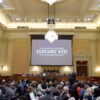The wheels have been falling off the global warming bandwagon well before Climategate and the recent hole-poking of the much trumpeted Intergovernmental Panel on Climate Change’s (IPCC) report. In a national survey last January by the Pew Research Center for the People & the Press, global warming ranked 20th out of 20 as far as top priorities for 2009. Only 30% of Americans felt global warming should be a top priority while 85% rated the economy as a top priority. It’s 2010 and not much has changed except that global warming is even less of a priority:
Dealing with global warming ranks at the bottom of the public’s list of priorities; just 28% consider this a top priority, the lowest measure for any issue tested in the survey. Since 2007, when the item was first included on the priorities list, dealing with global warming has consistently ranked at or near the bottom. Even so, the percentage that now says addressing global warming should be a top priority has fallen 10 points from 2007, when 38% considered it a top priority.”
The economy and jobs rank numbers one and two, respectively. To paraphrase Heritage Senior Policy Analyst Ben Lieberman, why would Congress attempt to address number 20 with a cap and trade system at the expense of numbers 1 and 2? The Boxer-Kerry Senate cap and trade bill would reduce economic activity (GDP) by $9.9 trillion from 2012-2035. Job losses would exceed 2.5 million by 2031. And cap and trade wouldn’t even tackle number 20 as it would have a negligible effect on the global temperature.
Although it’s highly unlikely President Obama would sign into law a cap and trade bill this year, there is a good chance an energy bill will reach his desk. Energy ranks 11th on America’s 2010 priority list — falling from 6th a year ago. Gasoline prices continue to rise as global demand increases but Americans are still living in a recessionary environment. Congress’s push for renewable energy mandates will only result in pricier energy. Instead, Congress should send clear market signals to the energy industry and peel back unnecessary regulations that prevent drilling for oil, building new nuclear plants and construction of renewable energy sources.
Putting in place an unwavering regulatory environment will do more for the economy, jobs and energy than Congressional planning to tackle these issues. It was economist Milton Friedman who said, “If you put the federal government in charge of the Sahara Desert, in 5 years there’d be a shortage of sand.” The same could be said for energy.



























